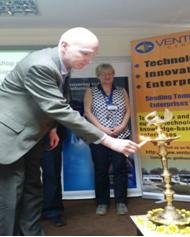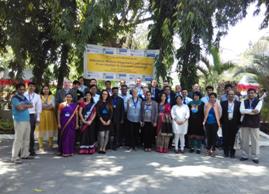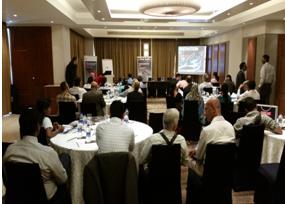26th June 2015 Mumbai, India
Global challenges, affordable solutions
Ever wondered what happens when medicine, research and innovative technologies come together? One result is mind-blowing breakthroughs and techniques that better help the diagnosis and treatment of diseases. With this in mind we brought together experts from India and the UK to discuss the potential for collaborative partnerships in affordable medical technologies.
 We held joint workshops earlier this year in Pune and Chennai with six senior researchers and experts from the University of Strathclyde, the University of Southampton, the University of Edinburgh, the Open University and the UK’s Health tech and Medicine Knowledge Transfer Network. We were particularly overwhelmed with the support and response received from the Indian government representatives and experts across leading research institutes, hospitals and companies. The workshops in each of the two cities were attended by about 50 delegates, showing the broad appeal and appetite for joint partnerships in this area and the mutual interests that exists in India and the UK.
We held joint workshops earlier this year in Pune and Chennai with six senior researchers and experts from the University of Strathclyde, the University of Southampton, the University of Edinburgh, the Open University and the UK’s Health tech and Medicine Knowledge Transfer Network. We were particularly overwhelmed with the support and response received from the Indian government representatives and experts across leading research institutes, hospitals and companies. The workshops in each of the two cities were attended by about 50 delegates, showing the broad appeal and appetite for joint partnerships in this area and the mutual interests that exists in India and the UK.
The UK has demonstrated its expertise in developing innovative healthcare solutions like in digital health, clinical services, etc. and India has delivered some excellent examples of affordable health care to the masses like the LV Prasad Eye Insitute, Narayana Hridayala, to name a few. With rising healthcare costs globally, ‘affordability’ is undoubtedly an important driver when planning healthcare. Other drivers like accessibility to these technologies, the regulation and policy guidelines behind the development and the usage of these technologies; and taking ideas from the lab to the market place are important considerations. These were just a sampling of the topics discussed at the workshops. In addition, we showcased affordable medical technologies that have been developed in India and the UK. 
In case you are interested in learning more on the deliberations and recommendations that were highlighted at the workshops, please do read our published e-reports of proceedings in Chennai and Pune. Here’s a press release on one of UK’s technological interventions that was showcased at the event and captured by the local press in Chennai.
 Since the workshop, my colleagues Sam Kumar from Chennai and Murtaza Khan from Bangalore recently visited The Bio-medical Technology Wing, of Sree Chitra Tirunal Institute for Medical Sciences & Technology. So do watch this space for more information on the visit and the possible collaborative opportunities in Kerala.
Since the workshop, my colleagues Sam Kumar from Chennai and Murtaza Khan from Bangalore recently visited The Bio-medical Technology Wing, of Sree Chitra Tirunal Institute for Medical Sciences & Technology. So do watch this space for more information on the visit and the possible collaborative opportunities in Kerala.
Related Links:
Mark Sinclair’s blog on S&IN events this year
Pictures of the workshop